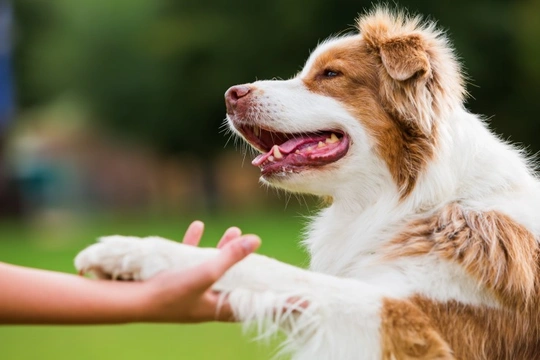
Potential reasons why your dog might be chewing their paws
Dogs tend to pay a reasonable amount of attention to their own bodies, in terms of licking and self-grooming, and sometimes gnawing or chewing at knots, matts or things that itch a little. While this is all normal and within the range of behaviour that all dogs display from time to time, if your dog is exhibiting a fascination with chewing at their own paws, this can indicate a potential problem in the making, which may be either physical or behavioural.
Regardless of its origins, this behaviour can become habit-forming very quickly, and can of course cause problems in and of itself, such as weakening the skin of the paws, causing cracks, splits and infections.
In this article, we will examine some of the most common physical and behavioural reasons behind why dogs sometimes chew their paws, and some of the ways in which this can be resolved. Read on to learn more.
Allergies
Allergies such as those caused by environmental toxins, food and other triggers can lead to a range of different symptoms in dogs, including hayfever-like symptoms, digestive upsets, and itchy or irritated skin.
If your dog is suffering from a low-level allergy, the symptoms of it may be mild enough that they can go for a long time unnoticed-and if your dog’s feet or paws are itchy, they may spend a lot of time chewing at them to try to reduce the irritation.
Get your vet to check your dog out and potentially check for any allergies that they may be suffering from undiagnosed.
Flea infestation
If your dog is carrying a lot of fleas, this is apt to make them itchy and irritated across all of their body, and if they have developed a flea sensitivity as a result, each bite will be very annoying and even potentially painful for them. Fleas can and often do dwell in the warm, capillary-rich spaces between the toes, so if your dog is persistently chewing at their paws and claws, a flea infestation should be ruled out before moving on.
Foreign bodies
A thorn stuck in the pad of the paw or anything else that is bothering your dog’s feet can of course be very annoying, and make them limp and bother at their paws in a way that they wouldn’t normally.
The first thing to do is of course check your dog’s paws and feet over carefully to see if you can spot anything amiss-but you may not be able to see something even if there is something present, so do not rule it out on the basis of it looking ok alone. A thorn could have worked its way into the pad of the paw leaving very little, if anything to see-and small particles like tiny, hard grass seeds can get stuck under the lip where the nail exits the toe, being very annoying but virtually impossible to spot.
Talk to your vet if you think there might be a foreign body stuck in your dog’s paw, if you have ruled out other options and still cannot get to the bottom of it!
Injuries or pain
If your dog has injured themselves by overextending or getting a minor sprain, or if they have hurt their leg in another way, you may not be able to identify any swelling or other physical indication of a problem, but it may be aching or otherwise causing pain to your dog.
This can lead to licking, resting their foot or limping as well as other generalised indications of pain and discomfort, but if the injury is a simple strain or otherwise minor, should go away within a couple of days.
Boredom
Boredom can lead to a whole wide range of strange activities and behaviours in dogs, as they will seek virtually any outlet for their energies to give themselves something to do.
This can lead to obsessive behaviours such as biting or chewing the same area of skin repeatedly-much as some people continually bite their nails or chew the skin around the nails until it bleeds, even though they know what is going to happen!
If your dog is being left alone for too long at a time, does not have enough to do or is full of excess energy and not being walked frequently enough, they are apt to develop obsessive behavioural problems that can cover pretty much anything from digging to barking continuously to chewing their own paws.
Stress
Stress is another umbrella that encompasses a wide range of different manifestations and ways in which your dog may act out, and it is not always possible to tell what is causing the problem or why it is upsetting your dog.
If there has been a lot of change or upheaval in your home recently or something else going on that your dog might find confusing or upsetting, they may begin to obsessively lick and chew their paws-dealing with the root cause of the stress before it becomes habit-forming will help to prevent the issue from escalating.



